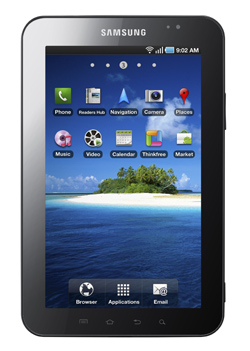The first iPad challengers are here

IFA, the big consumer electronics show in Berlin, officially starts today and several companies are using the event to announce long-rumored tablets, nearly all of which are based on Google's Android operating system. But do any of them have what it takes to compete with Apple?

The Tab supports both 2.5G GSM/GPRS/EDGE and 3G HSPA wireless networks, as well as 802.11n. Like the Dell Streak, the Tab is designed for voice communications, as well as 3G data, and you can use it either as a speakerphone or with a wireless headset (Bluetooth 3.0 is also on board). It has a front-facing 1.3MP camera for videoconferencing and a rear-facing 3MP camera that can capture still images and video. The software is organized around hubs for different applications including e-books (Kobo for books and Zinio for magazines), video and music. Samsung claims it is the first tablet to support DivX, as well as the usual video formats. Android 2.2 also supports Adobe Flash 10.1. The e-mail client, which looks a lot like the iPad, and calendar applications are also generating some positive first impressions. The Tab can also access the Android Marketplace, which has tens of thousands of additional apps.
Here is some early coverage of the Galaxy Tab:
- Samsung Galaxy Tab Hands On! [Android Central]
- Samsung: Galaxy Tab has leg up on Apple iPad [CNET] Samsung Galaxy Tab preview [Engadget]
- Hands-On with Samsung's Galaxy Tab Android Tablet [Huffington Post]
- Samsung's Galaxy Tab is Official [Technologizer]
The Galaxy Tab will be available in Europe later this month and "soon after" in the U.S. and Asia. Samsung has not announced pricing.
The second big tablet announcement at IFA came from Toshiba, which unveiled its Folio 100 at a press conference. The Folio is based on 10.1-inch capacitive touchscreen (1,024x768), and it is slightly thicker (0.6 inches) and heavier (1.7 pounds) than the iPad. It is powered by Nvidia's Tegra 2 processor, and comes 16GB of internal flash storage and an SD slot for adding more storage. Like the Galaxy Tab, the Folio will have a custom interface on top of Android 2.2 (though Toshiba has a lot more work left to do on its interface, according to Engadget).
Here are some links to early coverage of the Folio 100:
- Toshiba debuts Android-powered Folio 100 tablet [CNET]
- Toshiba Folio 100 preview [Engadget]
The WiFi only version will be available starting in the fourth quarter of 2010 in Europe, Middle East and Africa for around $500. The 3G version will be available early next year.
LG Electronics has gotten a lot of press with the promise that its Optimus Pad will be better than the iPad, at least for productivity applications, but so far at IFA it has focused on TV and other home entertainment equipment. Earlier this week, Sony announced a new lineup of e-book readers, but not a full-fledged tablet. Archos announced five MIDs/tablets, with displays ranging in size from 2.8 to 10.1 inches-all running Android 2.2. And ViewSonic announced 7- and 10-inch tablets, also based on Froyo. HP plans to release its Windows 7 Slate later this year, followed by a webOS tablet in early 2011.
Of these pretenders, Samsung's Galaxy Tab seems to have the best shot at luring based on it specs, a solid user interface and some very positive early reviews. Though if the rumors are true, the pricing could scare off some would-be buyers.